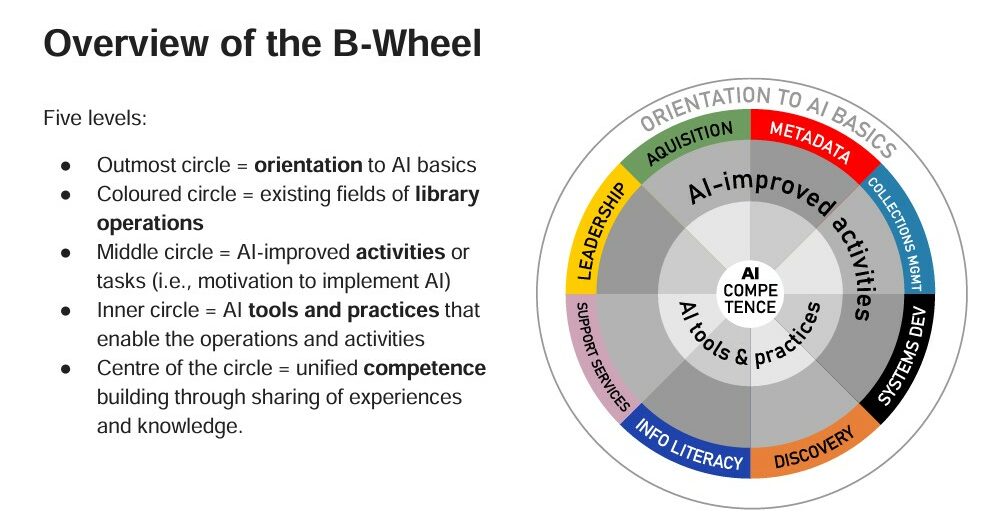Taming the Dragon: Librarians, Creativity and AI
In another whirlwind year for advances in artificial intelligence, librarians took bold steps to find innovative applications for AI tools. The final webinar of 2024, the Year of the Dragon, was a brilliant exchange of strategy for mastering AI in libraries.
Click here to catch-up with De Gruyter and Gold Leaf’s quarterly webinar series.
Taming the Dragon was the final instalment of 2024 in De Gruyter Brill’s quarterly webinar series for librarians. There were more than 600 registrants – a record for the series – and the conversation built on the debate about artificial intelligence that began in December 2023 with Artificial Intelligence: The Great Divider.
Unusually, the most recent webinar featured three sessions and four speakers before concluding with the customary Q&A session. It was sponsored by Andrea Gregor-Adams of De Gruyter Brill and moderated by Linda Bennett of Gold Leaf.
You are currently viewing a placeholder content from YouTube. To access the actual content, click the button below. Please note that doing so will share data with third-party providers.
Mark Hughes, Head of Library Services at Cardiff Metropolitan University, began with a slide that he described as addressing “the elephant in the room.” He presented a selection of comments found online covering the full spectrum of opinion on AI, from the extremely pejorative to the considered and the supportive. They illustrated the passionate discussion that is provoked by hot topics like AI in libraries. The views expressed tended to amplify concerns, so it was challenging to cut through the ‘noise.’ Mark’s belief is that AI is a knowledge issue, not a technological issue; librarians, as the custodians of knowledge, must therefore engage with it.
In case you missed it: In June we sat down with Mark Hughes for an in-depth discussion of how AI is transforming academia. Click here to read.
Mark’s interest in AI goes back several years, including his work with the SCONUL sub-group on artificial intelligence, which cuts across the work of all the other SCONUL groups. SCONUL is the professional association for academic and research librarians in the UK, currently representing 192 institutions, whose first AI initiatives predated the launch of ChatGPT by about six months.
The SCONUL group is addressing AI from two main angles: librarians as informed consumers and librarians as information generators. There is considerable interest in its work across the library community. It has recognized gaps in librarians’ knowledge about AI, which has sparked It hosts “wonky” AI coffee mornings, sparked by the recognition of gaps in librarians’ AI knowledge. These sessions are open to librarians from member institutions at any level and take the form of a series of provocations that stimulate lively debate.
“AI is not really about technology; it’s about AI as information – how it’s created, presented, used and reused.”
What emerges is the continued uncertainty around AI, with regard both to its legal status and to academic integrity. There is a growing recognition that many researchers are now using AI and looking to it for inspiration. This has caused some problems: One library was asked to switch off its AI product because academics said it was too easy to cheat; but some great initiatives have also been developed.
One such initiative by SCONUL is the AI roadmap, which is being built via a series of strategic conversations with service providers. Some are focusing on AI integration and the back office; some have set up infrastructure teams; others are more concerned with ethics; and some have barely started work in this area. There is still little clarity on issues such as cost, but the landscape has moved on fast since the beginning of the year. During the current academic year, an AI literacy group will be set up by SCONUL, working with Jisc. The Fantastic Futures conference in September 2025 will also focus on AI.
Mark concluded by saying that AI is a disruption; but one that is becoming very familiar very quickly. It will continue to evolve as we still try to focus on unanswered questions. It’s not really about technology; it’s about AI as information – how it’s created, presented, used and reused. Information professionals therefore need to get involved and be at the center – to support themselves and their communities.
Linda thanked Mark and asked him if he had encountered any insurmountable challenges – anything that would make use of AI in academia too risky. He said that genuinely he had not. The use of AI in teaching, learning and research has shifted the framing from ‘insurmountable challenge’ to ‘gamechanger’.
“The library has twin roles: actively to explore the role of AI and to support others at the university with their own explorations.”
The next speaker, Jessica Morales, is Associate Dean for Collections and Open Initiatives at the University of Arkansas. She highlighted several AI developments at the University of Arkansas and described how the use of AI is transitioning from organic adoption to a more strategic approach. This means that it can be integrated with the strategic emphases of the University: career readiness and research excellence. AI has potential benefits for the university in three areas: academic progress, research initiatives, and teaching and learning faculty support.
Jessica then gave some specific examples. The architecture department at Arkansas launched a series of innovative workshops on using AI in a variety of contexts, from large-scale environmental projects to detecting patterns in materials. Researchers working on the development of robotic solutions found a use for AI in assessing safety and accuracy. and also improvements to autism detection. Meanwhile, a series of teaching and learning workshops was also set up to take a more strategic approach to policy and the integration of AI tools.
Jessica echoed Mark when she spoke of the library’s dual role here: to actively explore the functions of AI and to support others at the university with their own explorations. Student workshops have been set up which rely on librarians’ expertise in information literacy to encourage the responsible use of AI. Their skills as librarians become more important as new AI tools continue to emerge. The library has also created a space for staff to share their personal experiences in how to use AI; and the library continues to monitor and experiment with AI tools offered by third parties.
Jessica says all these initiatives are still very ad hoc, but she is confident that they will provide a solid foundation for future uses of AI at Arkansas. The next phase – sponsored by the provost’s office – will consist of setting up a university-wide task force, including representatives from faculty, IT, research, the library and others, to work on recommendations that could lay the foundations for a university AI policy. It should also be recognized that investment in the infrastructure is necessary – in the Institutional Repository and large data storage systems, for example.
“Designerly methods help different departments to focus on their own needs – ChatGPT can’t be used to translate poetry, but other tools are available for this.”
She concluded by saying that librarians, as custodians of long-standing centers for data and collaboration, are the obvious choice to help establish a framework for AI that allows privacy, accessibility and readability. She would encourage all librarians to “tame the dragon” and play an active role.
Dr Andrea Alessandro Gasparini, Chief Engineer at the University of Oslo Library, Norway, and Heli Kautonen, Chief Librarian at the University of Turku, Finland, gave a joint presentation on an AI assessment model they have called the “B-Wheel”. Since 2017, Andrea has been exploring the pros and cons of AI, coinciding with the rise of AI-developed library services. He understood that librarians wished to take a pragmatic approach, and he wished to complement this with a designerly approach. He was interested in the role that design had to play in the systematic use of AI in libraries. The B-Wheel seeks to anticipate the coming transformation between the library, its users, AI and AI developers.
Heli discussed three case studies featuring institutions in which the B-Wheel has been used. The preliminary field test took place at the University of Bergen, Norway and consisted of a workshop that looked at generative AI tools for study and research. The second trial was at the Finnish Literature Society, seeking to examine how the diverse operations of a learned society could ‘find their slot’ in this system and contribute to AI knowledge. It showed that designerly methods could help different departments to focus on their own needs by deploying the appropriate tool from those available. For instance, ChatGPT can’t be used to translate poetry, but other tools are available for this.
The third test was at the University of Turku, a much bigger organization where some AI development had already taken place. The B-Wheel was used both as a framework for comprehensive exploration and for hands-on testing of AI tools. The practical help that it highlighted for aspects of the library service – e.g., assistance in depositing stock materials more efficiently – was “the best thing that came out of it.” Heli concluded, “We cannot change the dragon, we can only outwit it with intelligence and creativity,” before posing the question, “Is data the new oil?”

The formal questions were followed by a stimulating Q&A session in which AI detection tools, training and dissemination methods were discussed, as well as specific tasks like using AI to produce better metadata.
The speakers were asked by an audience member to address the “existential question” of AI. In a nutshell: how could something that the questioner perceived to be inherently unethical, dishonest and bad for the environment ever be harnessed as a force for good?
Mark said that AI was still in the early stages of a technology that is transformative in so many ways. He likened it to the Model T Ford, first produced in 1921, which was a catalyst for socio-economic change. AI tools could follow a similar trajectory, only much more quickly. He agreed that solutions must be found for its environmental impact and for the rights of creators.
Heli said that the environmental impact could be mitigated by investing in local solutions and not relying on the big global companies. However, international legislation is also needed to create both political and value-based boundaries. Andrea added that it’s also about ensuring developing countries gain equitable access to AI tools – which means they should be available also in minority languages, such as Sami.
“Is data the new oil?”
Jessica applauded the cooperation that has been achieved in Finland. She said that it was essential to think about the thoughtful adoption of AI and doing things with the right intentions. In the United States, there is a tendency to think about the impact of the dollar, but “the more we can lean into values, the better we can use AI.”
Concluding, Andrea Gregor-Adams thanked the speakers for their stellar performances and the audience for attending. She said that in 2025 there would be another series of webinars on hot topics for librarians, which will be announced early in the new year.
To catch up with the whole event, please find the video recording here.
You might also be interested in this blog series
[Title image by Alex Sholom/iStock/Getty Images]
